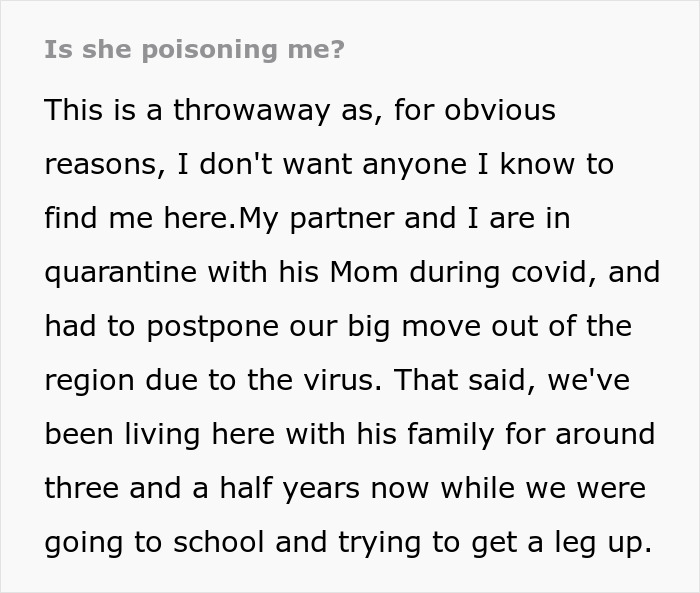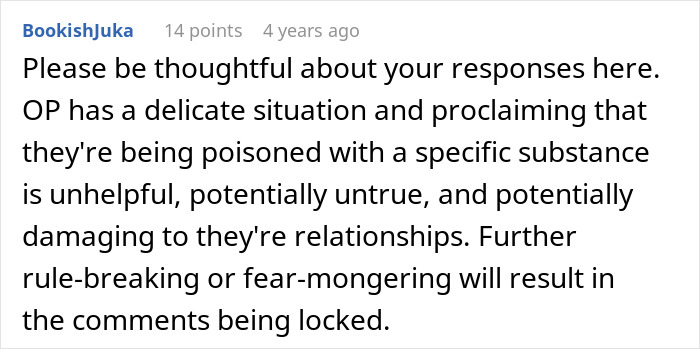Some people hit the jackpot with amazing in-laws. Others… not so much.
For this Redditor, living with their future mother-in-law has been anything but pleasant. Not only does she make it clear she doesn’t like them, but there’s also a disturbing pattern: every time she prepares a meal, they end up terribly sick.
So they turned to Reddit with a chilling question—could it be possible that she’s poisoning them? Read the full story below.
After living with their future mother-in-law for some time, the person noticed they got sick after every meal she made

Image credits: Visual__Production (not the actual photo)
It left them wondering—could she be poisoning them?







Image credits: voronaman111 (not the actual photo)





Image credits: BigOlWalrusMan
Why can mothers-in-law be so difficult and how to deal with it
The mother-in-law stereotype is everywhere. From pop culture to everyday life, the “monster-in-law” trope is hard to escape.
But behind that label are real people. And people are complicated—layered, sometimes irrational, and often frustrating to deal with, especially when you’re on the receiving end of their behavior.
In-law relationships are uniquely sensitive because they come with layers of family loyalty and power dynamics. They connect directly to the person you love, which makes finding harmony all the more challenging.
Experts stress that mothers-in-law who get under our skin aren’t usually born “evil.” As Dr. Lauren Phillips, Psy.D, told PureWow, “to say that a person is toxic is to reduce them to only bad qualities and dismiss any redeeming qualities or strengths. When we understand that ‘hurt people hurt people,’ we can more aptly identify the unhealthy aspects of a relationship that aggravate or even trigger us.”
Insecurity is often at the root. Old wounds can resurface, making people lash out through withdrawal, avoidance, or even aggression. And for many mothers, identity is tightly bound to their role in the family. According to Access Therapy, maternal influence has been seen as central to a mother’s purpose. So when a new partner enters the picture, it can feel like a threat to that influence, sparking fears of being replaced or becoming irrelevant in their child’s life.
Of course, none of this excuses toxic behavior, like the extreme actions described in the story above. But understanding why it happens can help us make sense of it and maybe handle it better.
So how do you deal with a difficult mother-in-law? Licensed clinical psychologist Dr. Bethany Cook shared some practical advice with PureWow:
1. Communicate with your partner
It’s not always easy—no one wants to play tug-of-war with family. But you should be able to share how you feel and what’s bothering you. Even if your partner hasn’t noticed, the goal is to walk away with mutual understanding.
2. Talk to your mother-in-law
Once you’ve been honest with your partner, they should support you in having a heart-to-heart with your mother-in-law. Dr. Cook suggests calmly expressing your feelings and using “I feel” statements to avoid putting her on the defensive. Preparing some notes ahead of time can help keep the conversation focused.
3. Minimize exposure
If nothing changes, it might be time to limit contact. That doesn’t have to mean cutting her off completely. As Dr. Cook explains, if your partner wants to visit their mom, let them go while you take some time for self-care. Less exposure often means less stress.
4. Set boundaries
Boundaries are essential. Whether it’s unannounced visits or constant criticism, you need to be clear about what’s okay and what isn’t. Healthy distance can allow a relationship to exist without overwhelming you.
5. Encourage your partner to enforce those boundaries
If your efforts fall flat, your partner may need to step in. As Dr. Cook notes, “that child is now your life partner and needs to…protect the union of the couple.” It may upset the MIL, but it reinforces that your marriage or partnership comes first.
Hopefully, you’ll never find yourself facing these issues. But if you do, these tips can help you protect your peace while keeping family relationships manageable.

Image credits: BETZY AROSEMENA (not the actual photo)
Readers felt the suspicions could be valid and offered advice on how to test it




























 Follow Us
Follow Us





